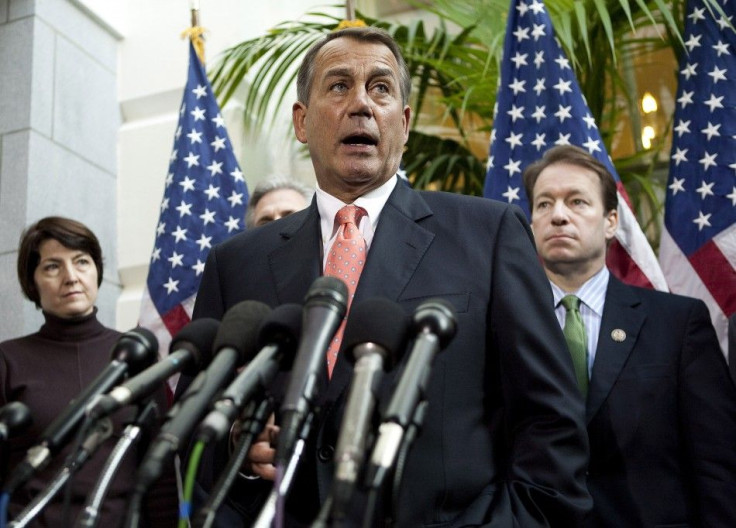Will Boehner Navigate Around Tea Party to Forge Payroll Tax Cut Deal?

(REUTERS) -- House Speaker John Boehner, hoping to spare fellow Republicans a second embarrassing defeat over payroll tax cuts, is prepared to navigate around rebellious Tea Party-aligned lawmakers to get a deal, according to congressional aides.
Republicans in the House of Representatives got a public drubbing from critics within and outside the party in December for initially refusing to approve a Senate plan to extend the tax break for 160 million Americans through February.
The party of lower taxes was left on the defensive, countering a barrage of criticism that its unwillingness to compromise threatened an effective tax hike on workers, potentially damaging the fragile economic recovery.
Now, with Democratic and Republican negotiators preparing for a new round of talks in the coming days to extend the payroll tax cut for the rest of the year, Republican leaders are anxious to move quickly to get a deal, aides said.
Party leaders fear another battle could distract from the more important task at hand - ousting President Barack Obama from the White House and winning majority control of the Senate in the November elections. They also want to neutralize an issue that Democrats already are using to their advantage in the presidential and congressional campaigns.
I think Boehner will seek a more accommodating approach to get a good percentage of Democrats to vote for it - even if it costs him a lot of House Republican freshmen, one House Republican leadership aide told Reuters.
His instincts will be not to be so reliant on House Republican freshmen, the aide added, referring to the 85 first-term congressmen.
The freshmen, many of whom are aligned with the populist budget-slashing Tea Party movement, helped the Republican Party win control of the House in 2010 and have since proven stubbornly uncompromising in the debate over taxes and spending.
Congress has until February 29 to agree on extending the tax cut, which would give the average middle-class family about $1,000 extra a year.
Support has always been soft among Republicans for the payroll tax cut championed by Obama. They question its effectiveness in stimulating the economy and the wisdom of using revenues intended for the Social Security retirement program.
But the political fallout from the December showdown with Democrats was so unpleasant for Republicans that some congressional aides now speculate that Republicans might push to accelerate a deal by January 24, when Obama gives his annual State of the Union address to Congress.
BIGGER BILL/BIGGER PROBLEMS?
Many Tea Party-aligned lawmakers in the House are bitter that Boehner ultimately caved to pressure and agreed to the two-month extension in December. When Boehner informed his caucus of his decision in a conference telephone call, rank-and-file members' phone lines were muted in an effort to quell dissent.
Some Tea Party lawmakers, however, see round two of the payroll tax cut negotiations as another opportunity to press their demands for cuts to unemployment benefits and some federal healthcare programs and a freeze on federal workers' pay.
Those are unlikely to be accepted by Democrats who feel they have the political upper hand. But in the end, Boehner is expected to settle for a deal that gets the job done even if he loses the support of scores of Republican freshmen.
A senior Senate Republican aide said December's drama might have even strengthened Boehner's hand. Given that a conservative groundswell in late December to block the two-month payroll tax cut, against Boehner's advice, backfired in a big way, some of those conservatives might now conclude that Boehner knows what he's doing and fall into line with him.
Boehner spokesman Kevin Smith would not address the potential divisions among Republicans. Instead, he noted bipartisan support for extending payroll tax relief for a full year, extending and reforming unemployment benefits, and offsetting the cost with spending cuts, while there is bipartisan opposition to tax hikes.
Freshman Republican Representative Jeff Landry, a Tea Party favorite, said that while he favors cutting workers' taxes, the payroll tax cut is a terrible idea because it taps revenues that are supposed to be dedicated to Social Security.
Asked about Boehner's strategy for getting the full-year extension through the House by February, Landry said: I don't know how he's going to play it. I hope he does a better job than the last time.
Landry said he will look closely to see if and how the next payroll tax cut is paid for. That is where Tea Party-aligned lawmakers could again make things more complex on Capitol Hill.
Many in Congress think this could be the first and last major bill to pass Congress in this election year, except for must-do spending measures to keep the government operating.
Lobbyists are bombarding Congress for requests to add pet projects onto the payroll tax cut bill - mainly extending about $35 billion worth of tax breaks for businesses that expired on December 31. Those include a research and development tax credit and a shorter depreciation period retailers enjoyed for business improvements.
While these tax incentives typically enjoy broad support in Congress, the lost revenues, amid huge budget deficits, likely will spark a loud debate over whether they must be paid for.
Republicans have long argued that the cost of these kinds of tax breaks do not have to be offset, as they spur economic growth over the long run and pay for themselves. It is an idea many Democrats and economists have challenged as unfounded.
Now, some fiscally conservative Republicans are joining in.
I think everything has got to be fully paid for. We can't afford to increase the debt more or rob more money out of Social Security, freshman Representative Jeff Denham told Reuters.
--
© Copyright Thomson Reuters {{Year}}. All rights reserved.





















